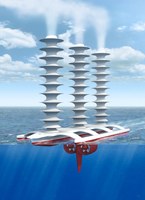 A major new initiative to ensure strict governance of any plans for solar radiation management (SRM) geoengineering (counteracting global warming by reflecting a small percentage of the sun's light and heat back into space) will be undertaken this year by The Royal Society, in partnership with TWAS and EDF. The first output will be a set of recommendations for the governance of geoengineering research, to be released late in 2010.
A major new initiative to ensure strict governance of any plans for solar radiation management (SRM) geoengineering (counteracting global warming by reflecting a small percentage of the sun's light and heat back into space) will be undertaken this year by The Royal Society, in partnership with TWAS and EDF. The first output will be a set of recommendations for the governance of geoengineering research, to be released late in 2010.
Proposed geoengineering techniques that reflect the sun's light and heat back into space may offer valuable opportunities to reduce global warming, and could do so quite rapidly, but it is likely that their impacts would also affect rainfall, regional weather patterns and ocean currents. These impacts would not be restricted by national boundaries, so actions in one country could have highly significant effects in another, for example by changing rainfall and so affecting agriculture and water supply.
John Shepherd, who chaired the Royal Society's Geoengineering the climate: Science, governance and uncertainty report published in September 2009, notes that, "The disappointing outcome of Copenhagen has shown that achieving global agreement to reduce emissions of greenhouse gases is not easy. Some countries or organisations may consider geoengineering methods by which they could deliberately alter our climate. Large-scale field trials of some solar radiation management techniques could cause damaging side-effects. It is essential that we consider beforehand what legislative mechanisms and guidelines are needed, to ensure that any research that is undertaken will be done in a highly responsible and controlled manner with full international agreement where necessary."
The initiative will engage with a variety of organisations, concerned with natural and social science, governance and legal issues, as well as environmental and development NGOs, industry and civil society organisations, from across the globe. This will ensure that evidence and opinion is sought from a wide range of stakeholders with appropriate expertise, leading to outputs that will centre on providing:
- Recommendations for the governance of both research and possible deployment of SRM techniques
- Best practice guidelines for any emerging research into SRM techniques
- A suggested framework for how SRM research could be undertaken through international cooperation
This initiative is being supported by a range of funders and partners, including the Carbon War Room and Zennstrom Philanthropies.
For information about The Royal Society, see: royalsociety.org
For information about EDF, see: www.edf.org/home.cfm

